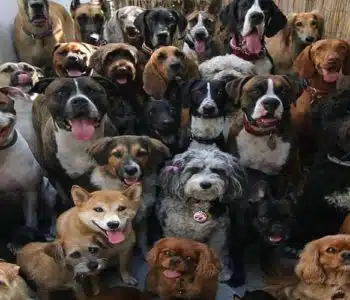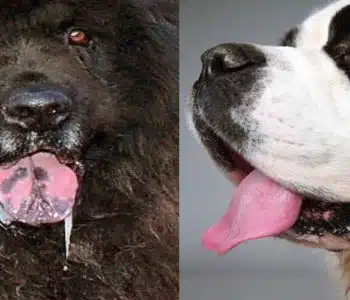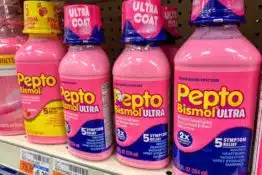
Blue Dachshund: The Colorful Doggo
Credit: lotty_blue_dachshund
What Is a Blue Dachshund: Meet the Royal Wiener in Steel Blue Armor
Do you find it hard to believe that Dachshunds can be blue? If so, you are not alone. Although Blue Dachshunds have been around for a while, they never fail to amaze anyone they meet. Their blueish tint is surely out of the ordinary, and strutting such a flashy puppy is undoubtedly an excellent conversation starter.
This pooch has a stunning coat, and the breed is famous for its lively personality. But the Blue Dachshund is not all fun and games. Their stylish outfit comes at a hefty price — these vivacious doggies are at risk of some serious health issues.
Here at Alpha Paw, we believe that you should know all the good and the bad about blue Doxies before you take the plunge and adopt one of them.

Three Reasons to Avoid Blue Dachshunds
While these pups have some of the less charming qualities of the Dachshund breed, such as their incessant need to bark at everyone and everything, their stunning color brings problems of its own. Here is what you may not like about having a blue-tinged Doxie:
- They are prone to skin problems. Their coat color carries the risk of specific skin issues that cause them to lose hair in patches. That can lead to many other conditions, including skin cancer. If you adopt this delicate pooch, you must tend to them with utmost care.
- They usually live shorter lives than other Doxies. The average lifespan of Blue Dachshunds is a couple of years shorter than that of other varieties of this breed. This is most likely related to their inherent health problems.
- They are incredibly bullheaded. If you are a first-time owner and don’t know anything about Dachshund training, you may find it hard to deal with this pup’s stubborn character (but you will enjoy these hilarious Dachshund memes!). Consider using treats and Dachshund gifts in your training process, it will be fun for both of you!

Three Reasons to Adopt the Blue Dachshund Puppy
Dachshunds are among the best dog breeds to adopt. These are the dazzling Blue Doxie qualities that always come to the fore:
- Their zappy personality. Dachshunds are energetic little fireballs that relish playing with people — we’re sure you’ll cherish every moment spent with your little sausage dog.
- Their boundless love. Once a Doxie accepts you as one of their pack, you are in for life! These pups have an inexhaustible well of affection for their human family.
- Their protective nature. They will always be on alert and yap at anything suspicious. While this is an admirable quality in any furry companion, you should socialize your pooch timely to avoid them becoming overprotective and aggressive.
IVDD Survivor Story – Hannah & Louis
If you already read our Dachshund breed guide, then you are well-versed in this superb dog! In case you are yet to dig into it, here are some essential Dachshunds facts you need to know.
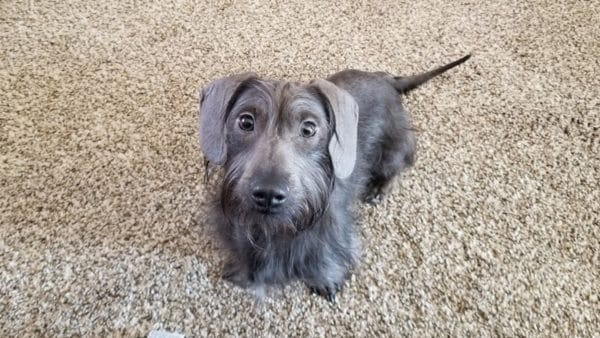
What Are the Diluted Dachshund Colors?
While most Dachshunds come in colors that are considered standard for this breed, some can carry a dilution gene that alters the base color. There are two types of dilution genes in Doxies—one that turns black coat into blue (gray) and another one that changes chocolate color into Isabella (fawn).
Red and cream Dachshunds can have those genes as well. When those coat colors are diluted, the result is a shade that appears slightly duller or lighter, not particularly distinguishable from the original hue.
Dilution genes are recessive, which means that dogs can carry them without being diluted themselves. Two copies of those genes are needed to produce a diluted litter. If one parent dog carries the necessary gene and the other doesn’t, the cubs cannot become blue or Isabella. Only when two dogs with dilution genes mate will their puppies have the diluted coat color.
These are the possible Dachshund diluted coat colors:
- Blue and tan
- Blue and cream
- Solid blue
- Isabella and tan
- Isabella and cream
- Solid Isabella
The Physical Traits of Blue Dachshunds
Credit: bonothebluedachshund
Blue Dachshunds have striking steel blue or gunmetal gray coats. They are typically bi-colored — blue and tan or blue and cream — while solid blues are slightly less common. Although the American Kennel Club’s Official Dachshund Standard does recognize blue long-haired varieties, this hue usually appears in smooth-haired Doxies.
The black color is not allowed anywhere on the Blue Dachshund’s coat, while tan and cream can appear in the same areas as in any bi-colored Doxie:
- The sides of the jaw
- The inner part of the ear
- Above the eyes
- The chest
- The throat
- Inside and behind the front legs
- The paws
- The underside of the tail
Apart from having a distinctive coat, Blue Dachshunds are not unlike other members of the breed. They have long, sausage-like bodies that are low to the ground owing to their tiny legs. Their chest is broad and their body surprisingly muscular and athletic.
Blue Dachshunds come in two sizes — standard and miniature. The Blue Miniature Dachshunds are particularly adorable and sought after in recent years.
| Size |
|
| Weight |
|
| Height |
|
| Coat type |
|
| Color variations |
|
| Shedding |
|
| Eyes | Dark or blue; medium-sized; almond-shaped |
| Nose | Leather with a bluish sheen, gray, or self-colored; slightly arched |
| Ears | Rounded and floppy; medium length |
| Temperament | Clever, brave, rash, energetic, strong-willed, curious |
| Life expectancy | 10–14 years, on average |
| Hypoallergenic | No |
| Kid-friendly | No |
| New owner friendly | Yes |
| Breed recognition | Recognized by the American Kennel Club in 1885, but classified as a non-standard variety |
What Is an Isabella Dachshund and How Does It Compare to a Blue Doxie?
Although Isabella and blue are different coat colors, it is easy to confuse one for the other.
While blue is a dilution of the standard black, Isabella is a diluted chocolate color. Blue Doxies usually come in any of the shades of gray, and Isabellas are almost always light brown, beige, or fawn (check the image above!).

| Blue Dachshunds | Isabella Dachshunds |
| Black color dilute gene | Chocolate color dilute gene |
| Gray, steel, or lavender coat | Light brown, beige, or lilac coat |
| Black or gray nose, eyes, nails, and feet | Black or brown nose, eyes, nails, and feet |
Why Is There So Much Controversy Around Dilutes?
Even though both Blue and Isabella Wieners are extraordinary and exceptionally beautiful, their mesmerizing coat is connected with an increased risk of skin issues, particularly Color Dilution Alopecia. This illness is incredibly widespread among blue and Isabella dogs — one study concluded that a whopping 43% of diluted pups suffer from CDA.

The Leading Health Concerns in Blue Dachshund Puppies
Credit: oliviathebluehound
Blue Dachshunds are highly likely to suffer from several chronic and hereditary illnesses. As we mentioned, some are the direct outcome of the selective breeding of their gray coats, while others come with their specific body build. Either way, you need to take proper care of your Dachshund and take them to regular checkups to confirm they are healthy.
These are the conditions most commonly observed in Blue Doxies:
- Color Dilution Alopecia
- Intervertebral Disc Disease
- Obesity
- Diabetes
- Teeth Issues
- Eye Problems
- Seizures
Color Dilution Alopecia (CDA)
Color Dilution Alopecia is a canine condition associated with diluted coat colors — blue and fawn. Blue Dachshunds are exceptionally prone to it. If you intend to get one of these pooches, this is the primary Doxie health issue you should familiarize yourself with.
The main symptoms are:
- Dry, dull, and brittle hair
- Slow hair growth and regrowth
- Hair falling out at the follicle
- Thinning of the hair
- Hair loss and bald patches
CDA is not dangerous and can be reasonably controlled with topical medication. What makes it alarming is that it can contribute to other Dachshund health issues. Thin fur and bald spots expose the dog’s skin to sunburn and harmful UV rays, which can lead to serious skin problems, such as cancer. Unprotected skin is also prone to infections, allergies, rashes, and dermatitis.
Intervertebral Disc Disease (IVDD)
Intervertebral Disc Disease is the most common ailment in Dachshunds. Approximately one in four Doxies develops it at some point during their lifetime.
Dachshund’s short gams are apt at digging but are hardly strong enough to support their bulky torsos, especially during strenuous activities. That can lead to rapid back problems and painful disc herniation. If IVDD is left untreated and you don’t limit your pup’s activities, the condition can progress into paralysis.
Although some Doxies develop IVDD due to their genetic predisposition only, many get it because of overexertion. To curb its onset, don’t let your Wiener’s exercises become too vigorous for their fragile back. Try to keep them away from stairs, and consider investing in a PawRamp to make their climbing on and off furniture easier.
Take extra care when you pick your pooch up and instruct others how to do it properly. Remember that you have to hold your goggie both under the forelegs and around the hind legs when you carry them.
Obesity
Dachshunds are huge gourmets and will likely devour their meals in a jiffy! Since they love munching a lot, you have to watch their portions and give them treats sparingly. Try to give them ample opportunities to be active as it will also help curb obesity.
As a rule of thumb, all small breeds are prone to gaining weight quickly, so you have to make sure that doesn’t happen to your Wiener. Not only will excessive weight be detrimental for your doggo’s back, but it could lead to several severe illnesses, such as various heart and joint issues and the next item on the list — diabetes. If your pooch puts on weight, their legs will suffer from great pressure. Make sure you find a way to keep their joints healthy.
Diabetes
Although obesity can trigger diabetes, it can also manifest through your dog’s sudden weight loss, particularly if joined with frequent urination and unquenchable thirst. If you suspect they have diabetes, make an appointment with the vet to check your doggo’s blood sugar levels.
Teeth Issues
Rapid weight gain is not the only trouble you have to watch out for in your small dog. They are also susceptible to bad teeth. Their jaws are too small to accommodate all their teeth, so they are often crooked and ridden with plaque. As a result, their teeth decay early and are even in danger of falling out.
Take proper care of your pooch’s munchers by brushing them often, give your buddy one of top 10 best dog dental chews, and take them to regular teeth checkups.
Eye Problems
Diluted colors in Dachshunds are linked to vision problems, in a similar way the color white is. The genes responsible for these coat colors were shown to contribute to glaucoma, cataracts, and even blindness. Make sure to take your pooch to frequent eye exams to verify their peepers are healthy.
Seizures
Dachshunds can be prone to seizures. Spasming and paddling are symptoms that should signal you to take your pooch to the vet immediately.
| Major concerns | Minor concerns | Occasional tests |
|
|
|
The Blue Dachshund Grooming Requirements
Blue Dachshunds are typically short-haired, and if they are healthy, they don’t have any particular maintenance needs. Brush their teeth and fur a couple of times a week and give them an occasional bath. Clipping their nails twice a month will keep your floors in pristine condition. Here are more care tips for dog owners and the best dog grooming tips.
In case your pooch develops CDA, you will have more work to do to keep your pup spiffy. You’ll apply the ointments your vet recommends daily to postpone hair loss as much as possible, and you may need to take additional preventative measures. Use only all natural dog shampoos. If you notice that your Dachs is suffering from dry skin, think about changing their nutrition.
| Brushing frequency | Brushes for Blue Dachshunds |
| Weekly |
|
What Exercise Regime Will Keep Blue Doxies Satisfied?
Your puppy’s exercise needs depend on their age, size, and health. Standard Blue Dachshunds will be purrfectly happy if you let them prance for about an hour every day. A Blue Miniature Dachshund will do fine frolicking for half an hour, which is also the recommended activity time for a senior dog.
If the weather is bad, and you are stuck at home with your sprightly pup, keep them busy with active play. Here are some ideas:
- Fetch
- Catch
- Hide-and-seek
- Tug-of-war
- Football
- Jump-the-obstacle
In case your pooch suffers from IVDD or a related problem, you’ll need to monitor their activities. Keep them from jumping on furniture and avoid playing indoor games that involve a lot of hopping. Take them walking on level terrain or wooded areas that they can freely and safely explore.
| Activity level | Recommended miles/day | Activity minutes/day |
| Medium | 7 | 60 |
What Kind of Food Will Make Blue Dachshunds Happy?
If you are wondering whether kibble or wet food is better, the truth is that it’s purely your dog’s personal preference. Give them both a go and see which one makes your little muncher run to his or her bawl!
Whichever they choose, we’ve got you covered — here are the best dry dog food for small dogs and best canned dog food.
To make your food selection easier, we reveal the worst dry dog food you should avoid at all costs! If you have a senior dog, you may skip right to the best senior dry dog food that contains all the right nutrients for your aging fellow.
Watch Dr. Ross’s Review on Dog Ramps
- Blue Buffalo Divine Delights Natural Adult Small Breed Wet Dog Food Cups
- Amazing Omega for Dogs – Dog Fish Oil Pet Antioxidant for Shiny Coat, Joint and Brain Health
- Kibbles ‘N Bits Original Dry Dog Food Small Breed Mini Bits Beef & Chicken
Training a Blue Dachshund
Proper training can bring out the best in any dog, but rest assured that your Blue Dachshund will give you a good run for your money!
This breed is so tenacious that they will drive even the most patient trainers to the curb! First of all, try to avoid common mistakes in dog training. Do your best to establish yourself as the pack leader, arm yourself with patience, and a couple of treats (but don’t overfeed your pup!), and you may succeed in obedience-training your mulish buddy. For more tips, check out our suggestions on how to potty train Dachshund, as well as the best ways to train your puppy.
To make sure you don’t compromise your dog’s health with poor-quality snacks, refer to our guides:
Best Dog food for Blue Dachshund
Nourish your Blue Dachshund with the finest nutrition tailored to their specific needs. Explore our top picks for dog food that emphasizes quality ingredients balanced nutrition, and promotes the overall well-being of your cherished Blue Dachshund companion. Discover the perfect blend that keeps your furry friend happy, healthy, and thriving.

- Features farm-raised beef as the number one ingredient and this naturally delicious premium food is made with added vitamins, minerals and nutrients.
- Made without artificial preservatives or flavors and with colors only from natural sources.
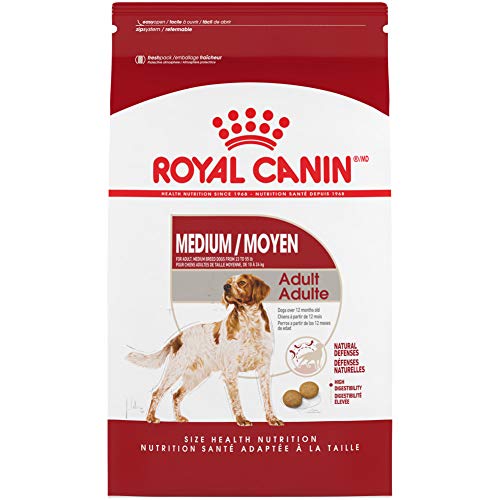
- Medium adult dry dog food formulated with precise nutrition specifically made for dogs 1–7 years old weighing 23–55 lb.
- Supports natural defenses for immune support with a blend of prebiotics and antioxidants for dogs.
- Maintains healthy skin and a healthy dog coat with optimal levels of EPA and DHA.
- Promotes dog digestive health with easy-to-digest proteins and a balanced supply of fiber.
- Palatable, medium breed adult dog food has an exclusive kibble design to encourage chewing.

- Complete and balanced nutrition has antioxidants, vitamins and minerals to help maintain a healthy lifestyle.
- Optimal levels of omega-6 fatty acid nourish the skin and help keep his coat shiny and healthy.
- Whole grains and a special fiber blend support healthy digestion with a delicious roasted chicken flavor.
- Unique, crunchy texture helps clean the teeth with every bite to support good oral health between brushings.
- Proudly made in the USA with the world’s finest ingredients; contains no high fructose corn syrup, artificial flavors or sugar.
The Blue Dachshund Temperament
Blue Dachshunds don’t have different personalities from other Doxies, so you can expect your puppy to have a particularly chirpy and yappy character! If they are your only living companion, rest assured you will not be bored for a second. They were a great inspiration for many people, including Picasso!
If you live with family, your doggo will be thrilled to have many avid admirers! An early introduction to unfamiliar visitors will easily hinder their aggression towards strangers.
In case you have kids, think twice before leaving your Wiener alone with them. They have little tolerance for persistent toddlers and may snap at them before you know it (unlike these breeds that are perfect for families with small children).
Check Out These Doxie Cross Breeds
Do you love Dachshunds but would like to get a pup that is not the typical Wiener? If the Blue Dachshund didn’t make the cut, browse through these intriguing Dachshund mix pooches. You may find what you are looking for!
FAQs: Blue Dachshunds
1. What is a Blue Dachshund?
A Blue Dachshund is a Dachshund with a blue coat color, characterized by a dilute grayish-blue hue. Learn about the genetics behind this unique coloration and how it differs from standard coat colors.
2. Are Blue Dachshunds recognized by breed standards?
While Blue Dachshunds may not be officially recognized by all breed standards, they are cherished by enthusiasts for their distinctive appearance. It’s essential to prioritize health and well-being overcoat color in breeding practices.
3. What are the unique traits of Blue Dachshunds?
Discover the specific traits associated with Blue Dachshunds, including temperament, size, and potential health considerations. Understanding these characteristics can help prospective owners make informed decisions.
4. How do you care for the coat of a Blue Dachshund?
Learn about grooming practices tailored to Blue Dachshunds, considering their coat’s unique characteristics. Regular brushing, appropriate bathing, and attention to skin health contribute to their overall well-being.
5. Are Blue Dachshunds prone to specific health issues?
While coat color itself doesn’t necessarily correlate with health issues, it’s essential to be aware of potential breed-specific health concerns in Dachshunds. Regular veterinary check-ups and a healthy lifestyle contribute to their overall health.
6. Can Blue Dachshunds participate in dog shows?
Dog show eligibility often depends on adherence to specific breed standards. While Blue Dachshunds might not meet the standards for some shows, they are celebrated in various circles for their unique and charming appearance.
7. How can I find a reputable breeder for a Blue Dachshund?
When seeking a Blue Dachshund, it’s crucial to choose a reputable breeder who prioritizes the health and well-being of the dogs. Look for breeders with a positive reputation, transparent practices, and a commitment to responsible breeding.
References
- https://en.wikipedia.org/wiki/Dachshund
- Beco, Luc, et al. “Colour Dilution Alopecia in Seven Dachshunds. A Clinical Study and the Hereditary, Microscopical and Ultrastructural Aspect of the Disease.” Veterinary Dermatology, vol. 7, no. 2, 1996, pp. 91–97., doi:10.1111/j.1365-3164.1996.tb00232.x.
- Kim, Jae Hoon, Kyung Il Kang, Hyun Joo Sohn, Gye Hyeong Woo, Young Hwa Jean, and Eui Kyung Hwang. “Color-Dilution Alopecia in Dogs.” Journal of Veterinary Science 6, no. 3 (2005): 259. https://doi.org/10.4142/jvs.2005.6.3.259.
- Adamson, Eve. Dachshunds For Dummies, 2nd Edition. John Wiley & Sons, 2007.
80% of Dogs Develop Arthritis or Joint Pain by 7 Years old – Here’s How to Protect Them
Most of us train our dogs when they are puppies to jump up on furniture. We think it’s harmless (and easier than always lifting them), but for dogs, couches and beds are very high compared to the size of their bodies.
Every time they jump it compresses their back and applies enormous force to their joints.
It’s no wonder that an incredible 80% of dogs experience arthritis or joint pain by only 7 years old.
Luckily, there is a vet-recommended solution.
It’s the PawRamp by Alpha Paw. An adjustable ramp that allows dogs to safely get on and off couches and beds. PawRamp makes joining you in bed or on the couch effortless and fun.
As a bonus, you can use code SAVE35 to get $35 off the PawRamp today.








